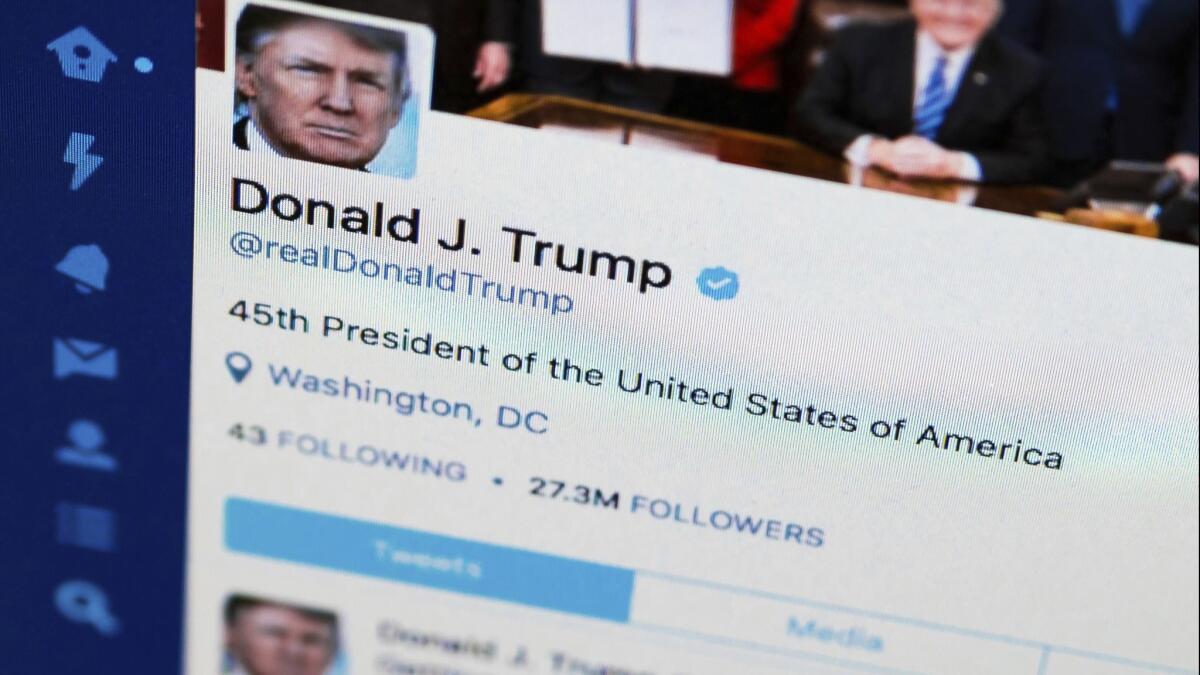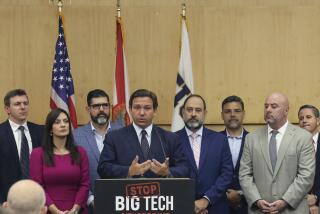Column: @realDonaldTrump isn’t just nasty. It’s unconstitutional

A senior federal district judge last week ruled that President Trump violates the 1st Amendment when he blocks his critics on Twitter.
But that’s just the most obvious aspect of the immensely interesting decision by Judge Naomi Reice Buchwald of the Southern District of New York in the case of Knight Institute, et al., vs. Donald J. Trump, et al.
Buchwald, who was appointed by President Clinton in 1999, is a jurist of the first rank. She is studiously non-ideological. Her ruling Wednesday brought equanimity and authority to the moral chaos that is Twitter. Her rigor is sorely needed, especially as Trump’s illogic and hysteria continue to set the tone in social media and geopolitics.
The plaintiffs in the case were the Knight First Amendment Institute at Columbia University and seven compelling individuals.
There’s lawyer and journalist Rebecca Pilar Buckwalter-Poza. Holly Figueroa O’Reilly, co-organizer of the March for Truth and mother of five. Joe Papp, an anti-doping advocate.
Philip N. Cohen, a sociologist. Nick Jack Pappas, a comedian. Brandon Neely, a former guard at Guantanamo.
Finally, there’s Eugene Gu, a surgeon known for having performed the first successful human fetal heart and kidney transplants in immuno-compromised rats. For his surgical work, which sets a path for curing kidney and heart disease in babies, Gu has been threatened, doxed and smeared by antiabortion extremists.
A heterogenous clan. Even racist pepperpot Tomi Lahren, the right-wing TV personality, could not twist this group into a monolith of snowflakes.
The defendants need no introduction: Donald J. Trump, former White House communications director Hope Hicks, spokeswoman Sarah Huckabee Sanders and social media director Dan Scavino. All the president’s publicists.
Even though he doesn’t bother to act like one, Trump is a public servant in an office that belongs to the people.
At one time or another, each of the plaintiffs criticized Trump on Twitter. Criticism of the powerful — “punching up” — was exactly the kind of speech the 1st Amendment was framed to protect. Trump-style sniping — “punching down” — is also, of course, protected speech.
But how might Twitter “blocking” infringe on the inalienable right of Americans to free expression?
In the case of non-state actors blocking one another, it doesn’t. We’re free as Twitter birds to block the heck out of each other.
But for once the law agrees with Trump: He is — at least while he’s president — exceptional. Even though he can’t be bothered to act like one, he is a public servant in an office that belongs to the people.
Buchwald’s painstaking 75-page judgment says that when @realDonaldTrump blocks someone it’s a suppression by the executive branch of free speech, in part because “the President presents the @realDonaldTrump account as being a presidential account” and “uses the account to take actions that can be taken only by the President as President.”
Indeed, Trump’s former spokesperson, Sean Spicer, also called Trump’s tweets “official statements by the President of the United States.”
Next, Buchwald reasons, “portions of the @realDonaldTrump account — the ‘interactive space’ where Twitter users may directly engage with the content of the President’s tweets — are properly analyzed under the ‘public forum’ doctrines set forth by the Supreme Court.”
A public forum! For those of us who have puzzled for 25 years over the legal status of the internet — is it a place, a machine, intellectual property, a weapon? — this is a breakthrough.
On my Twitter account, and yours, this “interactive space” — replies and retweets — might be something like a private front yard. We can shoo others off or even wall them out as we please. But in Buchwald’s judgment, replies and retweets on Trump’s account constitute a government-owned park that — according to the republic’s very first principles — has to be open to unfettered public expression and assembly.
Blocking renders both blocker and blockee invisible to each other. On being blocked by Trump, as the plaintiff Buckwalter-Poza recalls, “I stopped getting alerts for Trump’s tweets, and when other people were commenting on them, I would see all these gray boxes in my feed.”
Buckwalter-Poza was prevented from reading her president’s official statements, and she had no way to be heard by him or the vast audience that lands on his Twitter account.
And this violates Buckwalter-Poza’s 1st Amendment rights — as well as those of the other plaintiffs, and anyone #blockedbyTrump.
Buchwald didn’t order the president to unblock the plaintiffs or anyone else. She explained what the law is, and her expectation — or maybe her vain hope — was that the White House would fall in line with the Constitution. Of course, the decision is already being appealed, so we aren’t likely see Neely or Gu weighing in on the @realDonaldTrump thread about the North Korea summit debacle … yet.
But Buchwald’s decision is not incidental. “No government official is above the law … and all government officials must follow the law,” she bracingly wrote. Sing it. Better yet: She called Trump’s vindictive slapdowns of American citizens something more than violations of courtesy and norms. Buchwald discovered in Trump’s Twitter practices a “legally cognizable injury.”
“Injury” is the right word. Trump’s presidency — in lockstep with his Twitter feed — has been profoundly injurious to the nation and its citizens. It’s good to see Buchwald call Trump’s nastiness on Twitter what it is: an injury that’s not just indecent. It’s unconstitutional.
Twitter: @page88
Follow the Opinion section on Twitter @latimesopinionand Facebook
More to Read
A cure for the common opinion
Get thought-provoking perspectives with our weekly newsletter.
You may occasionally receive promotional content from the Los Angeles Times.






